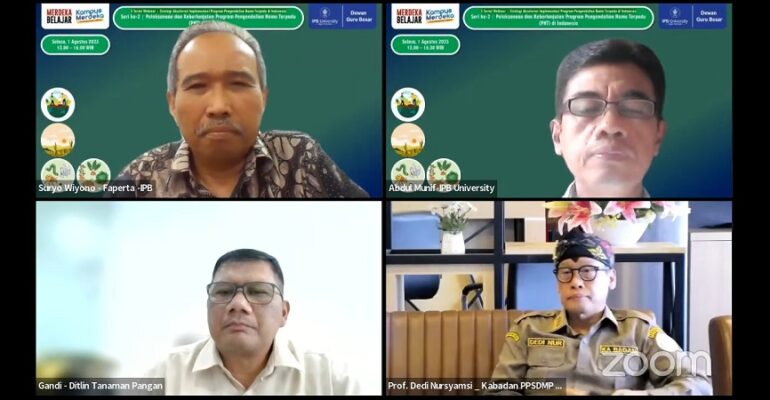IPB University Board of Professors Discusses the Future of Sustainable Integrated Pest Control Implementation

The Board of Professors (DGB) of IPB University again outlined the future of the implementation of Integrated Pest Control (PHT) through a webinar entitled ‘Implementation and Sustainability of PHT Programs in Indonesia’. Prof Evy Damayanti, Head of DGB IPB University, explained that this theme further reviews the implementation of PHT by reviewing approaches, problems, and challenges in its implementation.
“This FGD presents various perspectives that can be the main program and policy for the preparation of strategies for the acceleration of PHT programs in a sustainable manner in Indonesia,” she said.
Prof Suryo Wiyono, Professor of Agriculture IPB University, explained that the acceleration of sustainable PHT can be done by supporting healthy ecosystems and healthy plants as the basis for rice biointensive PHT. “The strategy is to nourish plants and agroecosystems. With tactics to increase the driving factor and reduce the confounding factor,” he explained.
Biointensive is a method of PHT that optimizes natural and biological control. The main components of biointensive farming, explained Prof Suryo, are seed bio-immunization, straw return, fertilization optimization, and pesticide removal. The advantage is an abundance of functional soil predators and microbes and an increase in the number of productive saplings.
“Compared to conventional treatment, both in the rainy and dry seasons, the percentage of productive saplings produced is much larger. The attack rate of leafhopper pests and stem borers also tends to be lower due to the presence of natural predators,” said the Dean of the Faculty of Agriculture IPB University.
For example, in Gresik in 2021–2023, during the four growing seasons, there was an increase in production of up to 15 percent, a reduction in NPK fertilizer of up to 40 percent, and the attack of retaliatory disease decreased sharply.
“Biointensive PHT can maintain sustainable production, which has been tested in various locations and seasons. To reduce synthetic pesticides and optimize NPK fertilizers, massive dissemination is needed,” he continued.
Prof Dedi Nursyamsi, Chair of the Agricultural Extension and Human Resources Development Agency (BPPSDMP), Ministry of Agriculture, added that the strategic command of agricultural development (kostratani) can be used as a strategic institution in the sub-district as an entry point for empowering farmers.
“Kostratani is able to support the success of sustainable PHT programs. Increasing the capacity of Kostratani requires synergy and support from all parties,” said Prof Dedi. (MW) (IAAS/MZS)



















